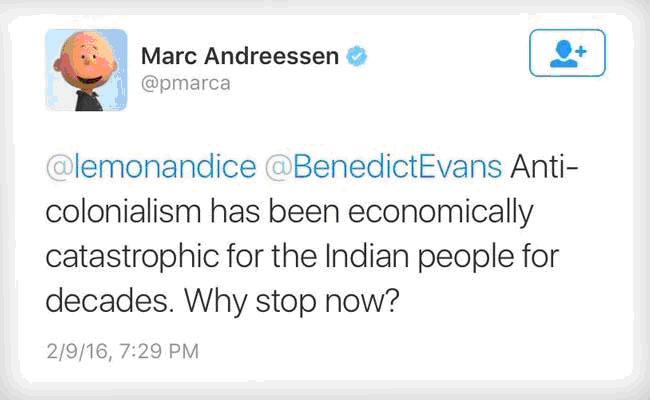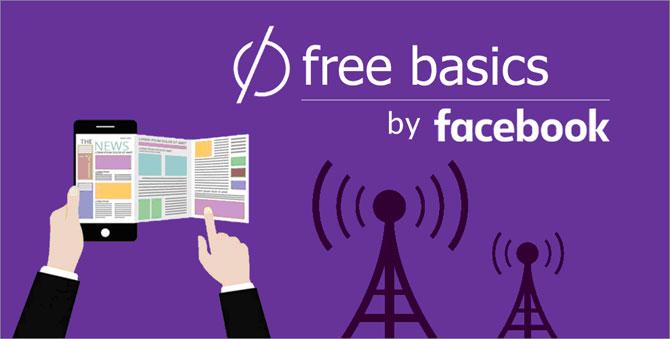Exploring why one man's gaffe has caused the love affair between Facebook and its second largest market, India,to go sour
Exploring why one man's gaffe has caused the love affair between Facebook and its second largest market, India,to go sour.
ADVERTISEMENT
On the 10th of February 2016, Facebook board member and Silicon Valley legend Marc Andreessen tweeted:
"I now withdraw from all future discussions of Indian economics and politics, and leave them to people with more knowledge and experience!"
How exactly did Andreessen get to this point? His part in Facebook’s troubles in India began after he sent a series of ill-advised (now deleted) tweets, which included one which read: "Anti-colonialism has been economically catastrophic for the Indian people for decades. Why stop now?"

Unsurprisingly, the Indian public hit the roof over what they viewed as a callous statement. In fact, Mark Zuckerberg, the CEO and founder of Facebook, had to personally issue a statement that called the tweets 'deeply upsetting.' This Twitter gaffe came at a most inopportune time. The messages were sent during a time when Facebook India was embroiled in debate with regulators over internet access.
The whole affair began on the February 8 when it emerged that India's telecommunications regulator had decided to block Facebook from operating its Free Basics service in the country. The regulator’s argument was that allowing it would shift the competitive environment in favor of Facebook, making it difficult for the smaller players in the industry to compete and was a violation of its 'net neutrality' principle.
This principle basically states that all internet traffic in India should be treated equally. Free Basics was built to offer users free access to a small set of websites that would be chosen by Facebook – on the flipside, many Indians equated this to colonialism. So why is India standing in Facebook’s way?
The Free Basics Idea was not fully thought through
Facebook's new service was ultimately an ill-conceived and poorly executed plan that aimed to increase internet access among the poor. However, what it effectively did was to wall in their users by having Facebook and its telecom service provider partners choose the websites they were allowed to visit.
Instead of having the freedom to carry out Google searches and visit any website they wanted, Free Basics users would find that Facebook had made itself the center of their online universe. It would only allow them to experience what it wanted them to.

What Facebook's executives did not seem to grasp was that the limiting factor for the growth of the internet in India is not data access cost, which is relatively low, but the cost of internet-capable smartphones and computers. When India's poor save up to purchase any of these gadgets, they want to experience internet as anyone else does: visiting any website they wish, downloading trading apps, games and applications, listening to music and watching videos. For example, Indian farmers already receive weather updates on radio and on the TV; they do not want to be restricted to the education sites that Facebook selected for them.
Facebook Failed To Borrow a Leaf from Consumer Product Producers
Google’s misguided moves in India provide a valuable lesson for tech innovators in Silicon Valley who are looking to make the step to their next billion users: sometimes, coding intelligence is not enough, you also need to develop ‘contextual’ intelligence. It is important to understand the new market’s complex histories, politics, economic situation and the prevailing socio-cultural mindset, which shape success in the developing world as much as the excellence of the product does.
The factors which define 'context' vary from one region to another in the developing world. However, what is more significant is that these regions are often miles apart from the environments in which tech innovations were developed. It does not matter if it is Boston, New York, Silicon Valley or the emerging tech enclaves of Asia, these high-tech cocoons are shielded from the context in which the technology is applied. In these environments, all systems and institutions function as they should, money rules above all and the digital app’s value proposition is all that matters. Because of this, technology companies like Facebook try to solve local problems from a distance, without being truly embedded into the environments where their applications are used.
The scenario above is in stark contrast to popular brands that produce consumer products such as Unilever or Nestle. Such firms are often tightly woven into the local environment and have channel relationships, sales, research and logistics teams in rural areas and even in the smallest towns in India. Even when a technology company like Facebook establishes a local office, the staff lack experience navigating the complex local regulations and do not understand the local politics involved in doing business in India.

Facebook Focused More on Code than On Context
Facebook did make an effort to try and simulate context in certain aspects of the environment in which the Free Basics program would be rolled out to its employees. For example, there was the 2G Tuesday initiative, where employees who worked outside the developing world would only be allowed to access the internet through a 2G service in order to gain a personal feel of what it is like to experience the slow speeds the next billion users are constrained by.

However, there is a limit to how much one can learn from the simulation, especially when the Facebook employee knows that there is still high-speed internet as soon as they step outside their office door. Facebook’s failure to fully embed itself with their future users, in order to gain an understanding of their day-to-day lives, meant that they did not really have to feel their hopes and fears or come to terms with their culture or history.
India Is Emotional About Its Turbulent History and Regulations Reflect This
One thing that all digital players must keep in mind is that every new country they venture into has its own different regulatory frameworks. In India, the regulations set out for businesses are the result of economic and legal considerations that also consider the nation’s political climate and history. In particular, Indians tent to be very sensitive to large Western firms that come into the country with supposed innocuous ways. For instance, the British East India Company had the noble intention of doing business with India when it first arrived, but eventually led to the colonization of the country.
Although India is a country that is notorious for its economic inequality, one thing that matters a lot to Indians is the shared feeling of egalitarianism. These factors have a huge effect on the decisions that regulators made with regard to Facebook. The Free Basics service had the misfortune of launching while the country was engulfed in a wave of pro-net neutrality and the service appeared to be a violation of the ideal.
The old adage states, 'The road to hell is paved with good intentions,' and despite Facebook's noble intentions, Andreessen, Zuckerberg & Co. failed to take the time to understand the people they were trying to help out. Nearly two centuries of subjugation at the hands of the British and the plunder of India’s resources is a wound that will take some time to heal, and Facebook simply failed to realise that.
The Final Word
It is widely estimated that there will be half a billion people in India and an additional two billion in other parts of the developing world who will be coming online during the next five years. This will happen without the help of Facebook, because computer and smartphone prices are dropping on an almost daily basis.
As this happens, the market for tech innovations will explode. However, Silicon Valley will have to quickly adopt the methods that have made consumer goods manufacturers so successful in emerging markets by understanding their history, politics and culture. In this way, firms like Facebook can start to win back hearts and minds in India again.
 Subscribe today by clicking the link and stay updated with the latest news!" Click here!
Subscribe today by clicking the link and stay updated with the latest news!" Click here!






